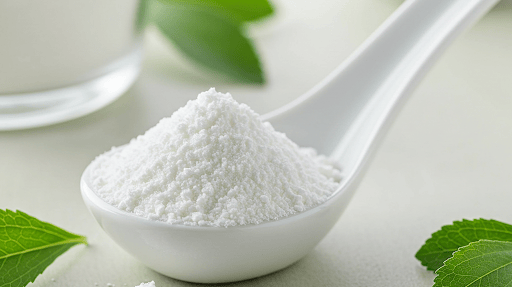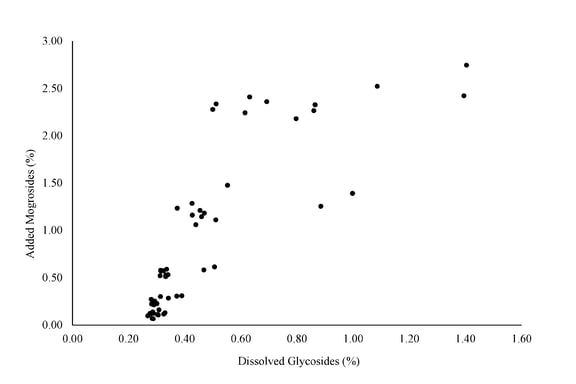Enhancing Steviol Glycoside Solubility with Mogrosides: Cargill's Innovation
BEVERAGESCONFECTIONARYDAIRY & ALTERNATIVES


This is an AI generated illustration and does not represent actual product or service.
In the ever-evolving food and beverage industry, the demand for low-calorie, natural sweeteners has surged as consumers increasingly seek healthier alternatives to traditional sugars. Steviol glycosides, derived from the leaves of the Stevia rebaudiana plant, have emerged as a popular non-caloric sweetener due to their intense sweetness and natural origin. However, their limited solubility in water has posed significant challenges for their use in various consumer products, particularly in beverages. Cargill’s latest patent application addresses this issue head-on, introducing a novel method to enhance the solubility of steviol glycosides using mogrosides, a class of natural sweeteners derived from monk fruit (Siraitia grosvenorii).
The Challenge with Steviol Glycosides
Steviol glycosides, such as rebaudioside A (Reb A), rebaudioside D (Reb D), and rebaudioside M (Reb M), are known for their high sweetness intensity—up to 450 times sweeter than sucrose. Despite their advantages, these compounds have poor solubility in water, especially at room temperature. For instance, Reb D requires near-boiling temperatures to dissolve completely, and even then, only limited concentrations can be achieved. This low solubility restricts the use of steviol glycosides in many consumer products, particularly in beverages, where high concentrations are often desired to match the sweetness of sugar.
Moreover, the sensory profile of steviol glycosides can be a limiting factor. While they provide sweetness, some glycosides, like Reb A, can impart bitterness at higher concentrations. Although newer glycosides like Reb D and Reb M have improved taste profiles, their limited solubility remains a significant barrier to their widespread adoption.
Cargill’s Innovative Solution: Mogrosides as Solubility Enhancers
Cargill’s patent application introduces a new method to improve the solubility of steviol glycosides by combining them with mogrosides, a group of natural sweeteners found in monk fruit. Mogrosides, such as siamenoside I, mogroside V, mogroside III-E, and mogroside II-E, are known for their high sweetness intensity and pleasant taste. Importantly, these compounds have been found to enhance the solubility of steviol glycosides in aqueous solutions, making them ideal for use in beverages and other water-based products.
The patent application describes an aqueous steviol glycoside solution comprising one or more steviol glycosides and a mogroside, with the weight ratio of total steviol glycosides to total mogrosides ranging between 0.5:1 and 4:1. This combination results in a solution where the solubility of the steviol glycosides is significantly higher than in an equivalent solution without mogrosides.
Key Components of the Invention
1. Steviol Glycosides: The composition can include one or more steviol glycosides, such as Reb A, Reb D, Reb M, and others. In some embodiments, the steviol glycosides consist primarily of Reb D and Reb M, which are known for their reduced bitterness and improved taste profiles compared to Reb A.
2. Mogrosides: The mogrosides used in the composition include siamenoside I, mogroside V, mogroside III-E, and mogroside II-E. These compounds are structurally similar to steviol glycosides but have different glycosylation patterns, which contribute to their solubility-enhancing properties. For example, mogroside V, the most abundant mogroside in monk fruit, is approximately 250 times sweeter than sucrose and has been shown to significantly improve the solubility of steviol glycosides in water.
3. Solubility Enhancement: The combination of steviol glycosides and mogrosides results in a solution that remains stable and soluble for extended periods, even at room temperature. For instance, the patent demonstrates that solutions containing mogroside V and steviol glycosides can remain soluble for up to 14 days at 23°C, making them ideal for use in ready-to-drink beverages and other shelf-stable products.
Applications in Food and Beverage Products
The enhanced solubility of steviol glycosides opens up new possibilities for their use in a wide range of consumer products. The patent highlights several potential applications, including:
- Beverages: The steviol glycoside-mogroside compositions can be used in carbonated and non-carbonated beverages, such as soft drinks, fruit juices, sports drinks, and energy drinks. The improved solubility allows for higher concentrations of steviol glycosides, enabling manufacturers to achieve the desired sweetness without compromising on taste or texture.
- Food Products: The compositions can be incorporated into various food products, including confectionery, dairy products, baked goods, and frozen desserts. For example, they can be used in ice cream, yogurt, and cereal bars to provide a natural, low-calorie sweetness.
- Pharmaceutical and Oral Hygiene Products: The enhanced solubility of steviol glycosides also makes them suitable for use in pharmaceutical formulations and oral hygiene products, such as mouthwashes and toothpaste, where a pleasant taste is essential.
Advantages of the Invention
Cargill’s innovation offers several key advantages:
1. Improved Solubility: The use of mogrosides significantly enhances the solubility of steviol glycosides, allowing for higher concentrations in aqueous solutions. This is particularly beneficial for beverage applications, where solubility is a critical factor.
2. Enhanced Taste Profile: The combination of steviol glycosides and mogrosides results in a sweetener with a more favorable taste profile, reducing the bitterness often associated with high concentrations of steviol glycosides.
3. Natural and Low-Calorie: Both steviol glycosides and mogrosides are natural, non-caloric sweeteners, making them ideal for use in low-calorie and sugar-free products.
4. Stability: The compositions remain stable and soluble for extended periods, even at room temperature, ensuring a longer shelf life for products containing these sweeteners.
By combining steviol glycosides with mogrosides, the company has developed a solution that addresses the solubility limitations of steviol glycosides while enhancing their taste profile. This innovation opens up new opportunities for the use of natural, low-calorie sweeteners in a wide range of consumer products, from beverages to baked goods. As consumer demand for healthier, natural alternatives to sugar continues to grow, Cargill’s innovation can play a key role in shaping the future of the food and beverage industry.




